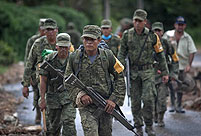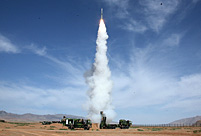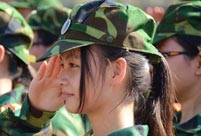Two years ago, Taiwan opened its doors to university students from the Chinese mainland, allowing about a thousand of them to study in Taiwan.
Now, the first batch of 173 students graduating this September has been brought down to earth due to restrictions. One of these is that they are not allowed to work in Taiwan after graduation.
Ren Handa, 24 years old, from Beijing is among them. After graduating from National Taiwan University with a Master's degree in Agricultural Economics, he had to come home to find a job.
However, his Taiwan experience did not help brush up his resume as many potential employers did not show much interest in his certification, and some had never heard of the university, Ren said.
Luckily, after rounds of interviews, he finally got an offer from a bank, while many of his friends were spending much of their own money flying back and forth between the mainland and Taiwan in the hope of landing a job.
"Even though my Taiwan experience did not really help me stand out from other competitors, it definitely diversified my experience and broadened my horizons," Ren told the Global Times.
Just like Kuomintang (KMT) legislator Chen Shei-saint told the media earlier, whether or not universities in Taiwan can attract more mainland students will depend on the employment rate of the first batch of such graduates.
People from both sides of the Straits are keeping a close watch on how the first graduates from the pilot program, labeled as "ice-breakers" or "new modern generation" by Taiwanese media, stand out among a competitive and shrinking job markets with a record 6.99 million students in the mainland.
Studying in Taiwan
Up till 2012, 30,000 Taiwanese students had attended universities in the mainland. Currently some 7,000 students are studying in the mainland, according to the Ministry of Education. However, the number is quite different across the Taiwan Straits.
Since 2011, about 2,000 mainland students have been accepted by public and private universities in Taiwan yearly, making up about 1 percent of students recruited locally, according to Taiwan data.
This is part of the island's campaign to attract talents from the mainland and ease the shortage of students at some universities due to low birthrate.
Lin Tsong-Ming, Taiwan's "deputy minister" of education, explained that studying in Taiwan let one learn elements of traditional Chinese culture that are lost in the mainland and discover Taiwan's democracy.
"Taiwanese people were so nice to us, they made us feel like we were giant pandas from the mainland," Li Zheng, 24, who was an exchange student in Shih Hsin University in 2009, told the Global Times.
Li said that her six months there were an eye-opening experience. He quickly noticed the differences in the education system. In class, students were often encouraged to have discussions and express their own opinions.
The curiosity is reciprocated. Many freshly arrived mainland students are often asked by their Taiwanese friends if McDonald's and KFC exist on the mainland, or if Beijing has a subway.
Chen Pai-Lin, an associate professor of journalism at National Chengchi University, told the Global Times that having top mainland students studying in Taiwan helps stimulate and enhance the sense of competition among their Taiwanese peers.
"It is like putting a catfish in a pool of eels. The survival rate will be increased due to the extra competition," Chen said.
But for many of their Taiwanese peers, mainland students are more than just friends, they are frenemies.
"Potential competitiveness from the mainland is a huge threat to students in Taiwan, I don't think Taiwanese students are ready for that," Max Chang, a senior student at National Tsing Hua University, told the Global Times.
Severe restrictions
That is probably why Taiwan only cautiously opened its doors to mainland students. Even though the Taiwanese legislature had lifted the ban on mainland students after years of discussions, it kept some restrictions in place.
Under the restrictions, mainland students are not allowed to apply for government or university scholarships; they cannot take civil servant exams; they are also barred from studying subjects involving national security such as military technology and aeronautics. And more importantly, they are banned from working in Taiwan after graduation, which seems to be the main bugbear for mainland students.
Ren explained that many of his peers on the mainland started looking for jobs while they were working on their graduation thesis. But students like him have to stay in Taiwan until they complete their studies to save time and money, instead of shuttling back and forth on a job hunt.
Yang Kai-Huang, director of the Taiwan-based Cross-Strait Research Center, told the Global Times that the restrictions show Taiwan's fear of the mainland.
"These unfair restrictions show Taiwan's fear of a growing mainland," Yang said. "The whole world is trying to get talent from the mainland but only Taiwan maintains a conservative attitude."
That explains why many mainland students prefer to study in Western countries like the US and the UK that are generous in providing scholarships, or other Asian countries and regions such as Singapore, Hong Kong and Macao.
Taiwan's universities are less competitive in recruiting talent than other Asian cities such as Hong Kong. In 2012, the number of mainland students enrolled in universities in Hong Kong reached 4,582, almost five times higher than the figure for Taiwan.
When the program was first launched in 2011, students from only six provinces in the mainland were qualified to apply, mainly from coastal provinces like Guangdong and Fujian. Application fees needed to be paid in advance. Moreover, only diplomas from 41 mainland universities were recognized in Taiwan.
As a result, only 928 students enrolled in 2011, failing to meet the original sought-for quota of 2,141. The second year, about 951 students enrolled, still falling far short of the target.
This year, amendments were made to attract more students, including welcoming students from two more provinces to apply, lowering application fees and increasing the number of mainland universities whose diplomas are recognized from 41 to 111.
But this year's results are still no cause for optimism. According the Taiwan-based China Times, 75 out of 122 Taiwan universities failed to bring in enough mainland students, with an enrollment rate of only 62 percent.
"Universities in Taiwan are not as attractive as they think they are," Yang continued. "Taiwan needs to adjust its policy toward mainland students if it wants to attract real talents."
However, Chen expressed concerns about opening up without restrictions.
"If the restrictions were lifted, I am afraid there would be not enough teaching facilities and staff for the increased number of students, which would reduce the over wall teaching quality," Chen said.
Taiwan leader Ma Ying-Jeou has promoted increased exchanges with the mainland since taking office in 2008 and has voiced support for relaxing the rules.
Mainland students have also taken part in the fight for their rights. Yu Zelin from Guangdong Province chose to study in Taiwan because he did not get a high score in the gaokao, the mainland's college entrance examination, in 2011.
Unlike many other students who remain silent, Yu decided to get involved. He gathered mainland students studying at different universities and discussed how they wanted to the restrictions to be amended. Yu later handed in their draft opinion to Taiwan "premier" Jiang Yi-Huah when he gave a speech at National Taiwan University last year.
"I am not really optimistic of having all the restrictions lifted," Yu told the Global Times. "Taiwan is facing a lot of domestic problems, so it would not be an easy decision to make."
Love is no saviour
So if the restrictions remain, what else can mainland students do? Ye Kedong, deputy director of the Taiwan Affairs Office of the State Council, gave one possible answer during a trip to Taiwan last year. They can find love in Taiwan, since love has no restrictions and limitations.
But many student couples said their relationships could not survive the pressures of reality. Li had a Taiwanese girlfriend while he studied. He stayed there for another six months after the exchange program to spend more time with her. But the restrictions prevented him from pursuing a postgraduate degree in Taiwan and they broke up.
Love stories like Li's are happening between many mainland students and Taiwanese students. Those sweet memories are now recorded in a book published last year called Mainland Students' Taiwanese Dreams, a collection of 55 students' experiences in Taiwan.
"Those memories could be very convincing for those who want to study in Taiwan," Professor Yang Ching-Yao of Tamkang University who initiated the book project, told Taiwanese media.
 Storms leave 97 dead, 58 missing in Mexico
Storms leave 97 dead, 58 missing in Mexico New model of indigenous surface-to-air missiles testfired
New model of indigenous surface-to-air missiles testfired  118.28-carat diamond to be auctioned in HK
118.28-carat diamond to be auctioned in HK Maternal love under streetlight
Maternal love under streetlight Naked foreign student sits in the middle of a road in Haikou
Naked foreign student sits in the middle of a road in Haikou  Colorful Yunnan: Enjoy the natural beauty
Colorful Yunnan: Enjoy the natural beauty Harbin named Chinese city with most beautiful women
Harbin named Chinese city with most beautiful women New college students' military training in Guangzhou
New college students' military training in Guangzhou Rugby girls
Rugby girls PLA's 38th Group Army conduct training
PLA's 38th Group Army conduct training Residences of the royal house of Savoy
Residences of the royal house of Savoy The last days of Wan Aihua
The last days of Wan Aihua Highlights at 12th National Games of China
Highlights at 12th National Games of China Beijing Film Academy welcomes freshmen
Beijing Film Academy welcomes freshmen Large mahjong party sets new world record
Large mahjong party sets new world recordDay|Week|Month